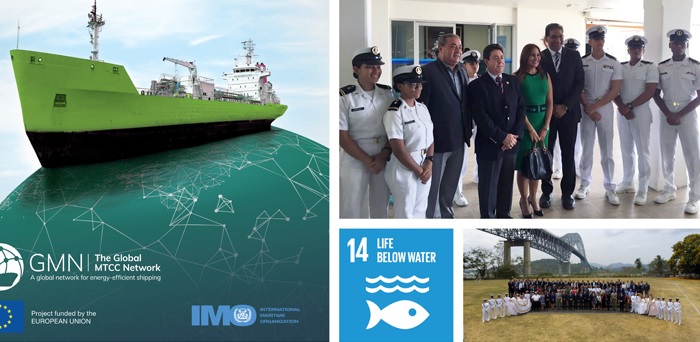The Latin America Maritime Technology Cooperation Centre, part of a global network established to further efforts to combat climate change, was launched in Panama, on 13 March. The centre, hosted by the Universidad Marítima Internacional de Panamá (UMIP), is one of five such centres set up under the GMN project, which is funded by the EU and run by IMO.
The centres, in Africa, Asia, the Caribbean, Latin America and the Pacific regions, act as regional focal points for a wide range of activities, which include improving compliance with existing and future international energy-efficiency regulations, promoting uptake of low-carbon technologies and operations in maritime transport, and establishing voluntary pilot data-collection and reporting systems to feed back into the global regulatory process. As such, they are expected to play their part in supporting the United Nations Sustainable Development Goals (SDGs).
The Latin America Maritime Technology Cooperation Centre (MTCC-Latin America) was launched at the host institute at a special event attended by representatives of the European Union, the Government of Panama, non-governmental organizations and academia as well as representatives from 17 countries in the region.
Speaking at the launch event, IMO’s Jose Matheickal said:
The global network of MTCCs will promote understanding and knowledge of technologies and operations to improve energy efficiency in the maritime sector and will help to navigate shipping into a low-carbon future.
Also speaking during the launch ceremony was the Minister of Maritime Affairs of Panama and Administrator of the Panama Maritime Authority, Mr. Jorge Barakat, who congratulated IMO for its efforts toward the promotion of a more energy-efficient maritime industry and reaffirmed the support of the Panama Maritime Authority.
The launch was followed by the first regional workshop run by MTCC-Latin America, on 13-15 March, where participants are being updated on the GMN project, sharing experiences of implementing IMO’s energy efficiency regulation and discussing constraints and opportunities.
The GMN project, formally entitled “Capacity Building for Climate Change Mitigation in the Maritime Shipping Industry” aims to enable developing countries, especially Least Developed Countries and Small Island Developing States, in the target regions to implement energy-efficiency measures through technical assistance, capacity building and promoting technical cooperation. Once operational, it will act as focal point for:
- improving capability in the region – by working with maritime administrations, port authorities, other relevant government departments and related shipping stakeholders to facilitate compliance with international regulations on energy efficiency for ships
- promoting the uptake of low-carbon technologies and operations in the maritime sector through pilot projects
- raising awareness about policies, strategies and measures for the reduction of ghg and other emissions from the maritime transport sector
- demonstrating a pilot-scale system for collecting data and reporting on ships’ fuel consumption to improve shipowners’ and maritime administrations’ understanding in this regard, and
- developing and implementing strategies to sustain the impact of MTCC results and activities beyond the project time-line.






























































